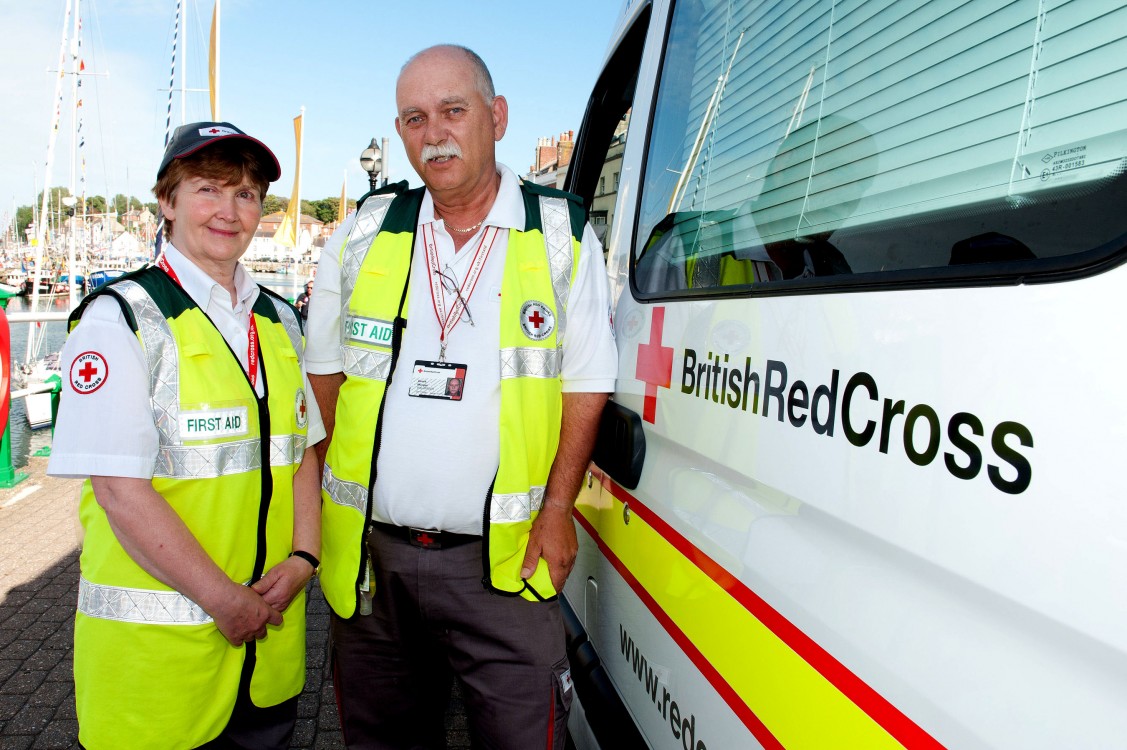
In the wake of harsh welfare cuts and the economic downturn, for the first time since World War II the Red Cross will be collecting and distributing food aid to the U.K.'s neediest.
Food poverty in the U.K. is on the increase. In 2012, the Trussell Trust, an association of charities and church groups that run food banks and publish food bank data each year, reported a 170% increase in food bank distribution in the U.K. compared to the previous year.
Now, with winter approaching and fuel bills expecting to rise, food supply organization FareShare has asked the Red Cross to step in to help Britain’s starving families.
In what is likely to become a growing movement across Britain, volunteers from the Geneva-based charity will be visiting supermarkets across the U.K. and asking shoppers if they can donate dry goods. The Red Cross will work alongside FareShare to distribute the donated goods to food banks throughout the country.
Red Cross's History of Helping the Neediest
The International Red Cross and Red Crescent Movement began in 1863. It was inspired by Henry Dunant, a Swiss businessman who was horrified by the number of soldiers who were injured in the Battle of Solferino in 1859 and left there to die.
Dunant proposed a series of national relief societies, led by volunteers who were trained in peacetime, to provide “neutral and impartial help” to relieve the suffering in war. In the wake of Dunant’s proposals, in 1863 the founding charter of the Red Cross was drawn up.
In July 1870, after war broke out between Prussia and France, Colonel Loyd-Lindsay called for Britain to follow the example of European countries and form a National Society. The following month, the British National Society for Aid to the Sick and Wounded in War was formed. In 1905, the Society was reconstituted as the British Red Cross.
During the Second World War, the Red Cross played a key role in Britain helping the nation’s sick and wounded servicemen. By the time the war ended, the Red Cross had sent over 20 million food parcels to British and Dominion prisoners of war.
Now, it seems uncanny that almost 80 years later, in the technologically sophisticated 21st century, the Red Cross for the first time since WWII is making a stunning re-emergence to once again distribute food parcels across what is supposedly the fourth richest country in the world.
But it’s not just the U.K. which is relying on the charitable distribution of food to assist families struggling to feed themselves. A report released by the Red Cross about the devastating humanitarian impacts of the financial crisis across Europe revealed a 75% rise in the number of people relying on food aid in the last three years.
According to the report, at least 43 million people throughout Europe are deprived of food daily, and 120 million are at risk of poverty.
In May, it was exposed that in the U.K. more than half a million people are now relying on food banks. Many charities and opposition political parties believe the government’s welfare cuts have intensified the situation, alongside the rising cost of groceries and the economic downturn.
Bekele Geleta, the Secretary General of the International Federation of the Red Cross, said the benefits squeeze will only make the problem worse in the long-term.
“While we fully understand that governments need to save money, we strongly advise against indiscriminate cuts in public health and social welfare, as it may cost more in the long run,” said Geleta.
Conservatives Mock the Hungry
Shockingly, certain conservative MPs are not only dismissing the problem, but are sneering at it.
After almost 150,000 people signed a petition calling for an inquiry into the increasing dependence on food banks, the Labour Party called for a debate about the issue in the House of Commons. During the food bank debate in Parliament, Work and Pensions Secretary Ian Duncan Smith was videoed ducking questions about the increase in food banks in Britain.
As Duncan Smith sneaked out of Parliament and nominated his deputy to speak for him, other MPs sneered and mocked hungry families relying on food banks in what has been dubbed “one of the most shameful episodes ever witnessed in Parliament.”
Conservative backbenchers hooted and snorted as Labour MP Fiona MacTaggart spoke of the startling scenes she had witnessed at her local Tesco supermarket in Slough, in the south of England, as poor families fought over price-cut food.
Struggling to be heard over the jeering, MacTaggart asked, “Isn’t that a shocking sign in the 21st century?”
Ester McVey, the deputy secretary for Work and Pensions who stood in for Duncan Smith after he snuck out of the debate, said in an ill-thought-out speech: "In the U.K. it is right that more people are going to food banks because as times are tough, we are all having to pay back this £1.5 trillion debt personally.”
Occupy.com spoke to Dan Higginbotham, who regularly spends his Friday nights volunteering in soup kitchens in Manchester in the north of England. In collaboration with Barnardo’s, the U.K.’s largest children’s charity, the Manchester soup kitchen serves hot food, sandwiches and tea and coffee to the city’s homeless or destitute.
“The general perception is that only those unemployed in this country are facing poverty, but from what I’ve seen through the increase in demand for foodbanks is that it can affect anyone,” said Higginbotham.
“Many people in the U.K. are now living on the brink of losing their homes and not being able to feed their families because of the rise in bills, low levels of income and how easy it is to get into debt. This is a growing problem that seems like it is only going to get worse, so the news about the Red Cross being called in comes as no real surprise,” he added.
So what is causing the food shortage crisis in Britain? A report titled Food Banks and Food Poverty, issued by the House of Commons, pointed to a variety of factors likely to be contributing to the growth of food bank usage in Britain. High global food prices are one factor making food less affordable for families on low income.
Another factor is the recession, which saw an increase in unemployment as well as earnings that have either stagnated or declined. The significant changes to the benefits system has also been attributed to the rise in food banks. As the report highlights, many speculate that welfare reforms – such as measures to control Housing Benefit and the abolition of Social Fund – are having the biggest impact on the increase in food banks in the U.K. The coalition government, meanwhile, claims there is “no robust link between the two.”
In June, the U.K.’s Office for National Statistics released a report that showed the U.K. as the world’s fourth richest nation. With a 2012 gross domestic product per capita at £21,692, and with the average family being reportedly better off than those in France and Japan, the U.K. lags behind only the U.S., Canada and Germany in terms of wealth.
It is therefore painfully ironic to many that despite the country's so-called wealth, the Red Cross has been called in for the first time since WWII to hand out food aid to assist the escalating number of households living in hunger. As the Shadow Work and Pensions Secretary Rachel Reeves told the House of Commons: “It’s a tale of two nations – tax cuts for the rich, food banks for the poor.”
3 WAYS TO SHOW YOUR SUPPORT
- Log in to post comments













